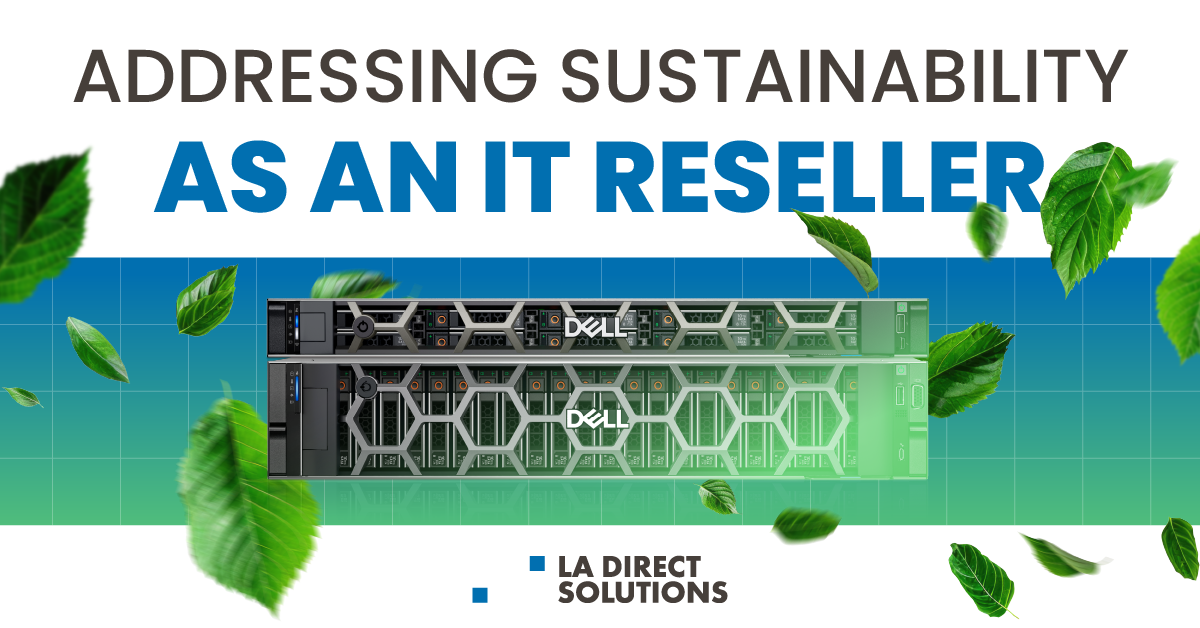
Addressing Sustainability as an IT Reseller
In today’s rapidly evolving digital landscape, addressing sustainability has become crucial for businesses across all sectors, including IT resellers.
Embracing sustainable practices is not only beneficial for the environment but also essential for meeting the growing expectations of socially conscious consumers and businesses. Here, we will explore how IT resellers can address sustainability and incorporate key aspects such as climate change, e-waste management, and supply chain sustainability.
Understanding Sustainability in IT
What does "sustainability" mean? In the context of IT, sustainability refers to practices that minimise environmental impact while promoting economic and social benefits. This includes reducing carbon emissions, managing waste effectively, and ensuring the longevity of IT equipment through refurbishment and recycling.
The Role of IT Resellers in Combating Climate Change
Climate change poses a significant threat to our planet, and the IT sector is a notable contributor to carbon emissions. By focusing on sustainable IT practices, resellers can play a pivotal role in mitigating these effects.
Carbon Footprint and Carbon Emissions: Simply by reselling refurbished IT hardware, you are significantly contributing to reducing the planet's carbon footprint. This positive impact arises from the fact that the organisation you purchased the refurbished hardware from has already integrated the item into the circular economy through their refurbishment process. By restoring and upgrading used equipment, they extend its lifespan and functionality, preventing it from becoming e-waste prematurely.
As a reseller, you play a crucial role in this circular economy by making these refurbished products available to direct consumers, thereby reducing the demand for newly manufactured hardware. This not only conserves valuable resources and energy that would have been used in the production of new items, but also minimises the environmental impact associated with manufacturing processes.
Effective Waste Management and Recycling Practices
One of the most pressing issues in the IT industry is the management of e-waste. Discarded electronic items, or e-waste, contain hazardous materials that are detrimental to the environment.
E-Waste Definition: E-waste refers to discarded electronic appliances such as computers, servers, and mobile devices. Proper disposal and recycling of these items are essential to preventing environmental pollution.
E-Waste Recycling: IT resellers should establish robust recycling processes to manage electronic waste. This involves setting up facilities for electrical disposal and partnering with certified recycling centres. Encouraging customers to recycle their electronics and offering incentives for returning used equipment can significantly enhance recycling efforts.
Embracing Corporate Sustainability
Corporate sustainability is about integrating sustainable practices into the core operations of a business. For IT resellers, this means ensuring that their supply chains are sustainable and transparent.
Supply Chain Sustainability: Assessing and choosing suppliers who adhere to environmental standards can drastically reduce the overall environmental impact. Additionally, compliance with the Corporate Sustainability Reporting Directive (CSRD) or any other relevant regulations ensures transparency and accountability.
Educating Customers on E-Waste Management
Raising awareness about the importance of e-waste management and the definition of discarded electronic items is crucial. Customers should be informed about what constitutes e-waste, what is e-waste, and the meaning of discarded electronics.
Highlighting facts about e-waste and environmental sustainability can motivate customers to engage in proper recycling practices. Providing information on 'e-waste recycling near me' and 'e-waste computer recycling' options helps facilitate easy and responsible disposal.
By implementing effective waste management practices, reducing carbon emissions, and promoting green IT, resellers can contribute to a more sustainable future. Embracing these practices not only helps in climate change and the impact on the environment but also meets the expectations of environmentally conscious consumers and businesses.